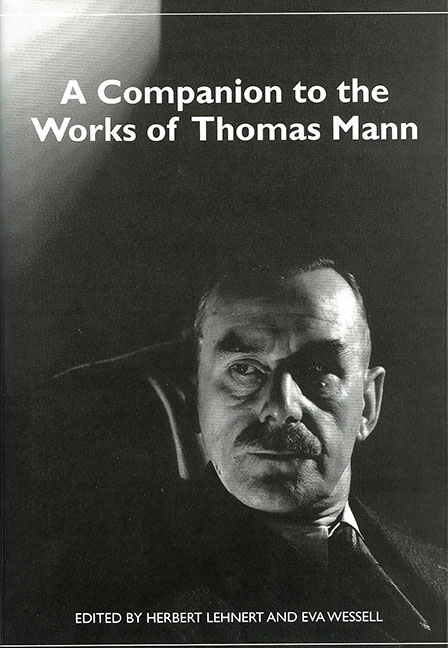Book contents
- Frontmatter
- Contents
- Foreword
- Thomas Mann's Works
- List of Abbreviations
- Introduction
- Thomas Mann's Beginnings and Buddenbrooks
- Art and Society in Thomas Mann's Early Novellas
- Love in Society: Thomas Mann's Early Stories
- “Death in Venice”
- “Mein ‘Friedrich’ — das ist was Anderes”: Thomas Mann's Unwritten Novel about Frederick the Great, King of Prussia
- Magic and Reflections: Thomas Mann's The Magic Mountain and His War Essays
- Thomas Mann's “Autobiographical” Stories
- Joseph and His Brothers
- Lotte in Weimar
- Thomas Mann's Late Politics
- “German” Music and German Catastrophe: A Re-Reading of Doktor Faustus
- The Gaze of Love, Longing, and Desire in Thomas Mann's “The Transposed Heads” and “The Black Swan”
- Felix Krull
- Female Identities and Autobiographical Impulses in Thomas Mann's Work
- Betrayed or Not Betrayed: A Testament?
- Thomas Mann's Comedies
- Notes on the Contributors
- Select Bibliography
- Index
Love in Society: Thomas Mann's Early Stories
Published online by Cambridge University Press: 28 April 2017
- Frontmatter
- Contents
- Foreword
- Thomas Mann's Works
- List of Abbreviations
- Introduction
- Thomas Mann's Beginnings and Buddenbrooks
- Art and Society in Thomas Mann's Early Novellas
- Love in Society: Thomas Mann's Early Stories
- “Death in Venice”
- “Mein ‘Friedrich’ — das ist was Anderes”: Thomas Mann's Unwritten Novel about Frederick the Great, King of Prussia
- Magic and Reflections: Thomas Mann's The Magic Mountain and His War Essays
- Thomas Mann's “Autobiographical” Stories
- Joseph and His Brothers
- Lotte in Weimar
- Thomas Mann's Late Politics
- “German” Music and German Catastrophe: A Re-Reading of Doktor Faustus
- The Gaze of Love, Longing, and Desire in Thomas Mann's “The Transposed Heads” and “The Black Swan”
- Felix Krull
- Female Identities and Autobiographical Impulses in Thomas Mann's Work
- Betrayed or Not Betrayed: A Testament?
- Thomas Mann's Comedies
- Notes on the Contributors
- Select Bibliography
- Index
Summary
The kind reader, looking back over the early stories of Thomas Mann — those light, delicious, bittersweet concoctions — may well be struck by the recognition that they are also a veritable freak show of crippled bodies and lives. And the thought may arise that their author must have been an unhappy young man indeed. Nor need we guess as to this, for he has told us himself: those years were a time of “numbness, emptiness, ice,” and also, he adds, of intellect and art, but that did not compensate for the lack of human warmth. The future looked bleak — recall Tonio Kröger's “for some there just is no right way.” But be assured: his luck is about to change.
Not, of course, all at once or right away.
Thus the little study “Gerächt” (Avenged, 1899), written when Mann was twenty-four, still emanates that same bitterness. Its twenty-year-old narrator, claiming to be tired of sexual excesses, is cultivating a “pure,” meaning a purely intellectual, friendship with an older Russian woman of “unambiguous and resolute ugliness.” This in itself should exclude all sensuality, but even so an “evil excitement” at times troubles the atmosphere. To clarify matters once and for all, the narrator bluntly explains to her that he appreciates the compatibility of their spirits but feels an abhorrence for her body. She accepts his declaration with apparent calm but returns his frankness by revealing that she had once had a sexual affair. He suddenly finds himself aroused by the thought that “this woman let someone make love to her. Her body has been embraced by a man,” and he suggests that they, too, should have intercourse. She rejects his advances and departs, “a mocking smile on her ugly lips.” The narrator, stupefied, taps his forehead and goes to bed.
Thomas Mann repeatedly protested that all his writings were based on his own life. “About me I am writing, about me” (GW 10, 22; Mann's emphasis), but we may question how much of this story is truly “lived.” Was there in fact a time of “debauchery” in the life of young Thomas when he was about twenty years old? His autobiographies do speak of a “late and violent outbreak of sexuality” at that age (GW 11, 111), but he is never specific as to its nature.
- Type
- Chapter
- Information
- A Companion to the Works of Thomas Mann , pp. 73 - 94Publisher: Boydell & BrewerPrint publication year: 2004



